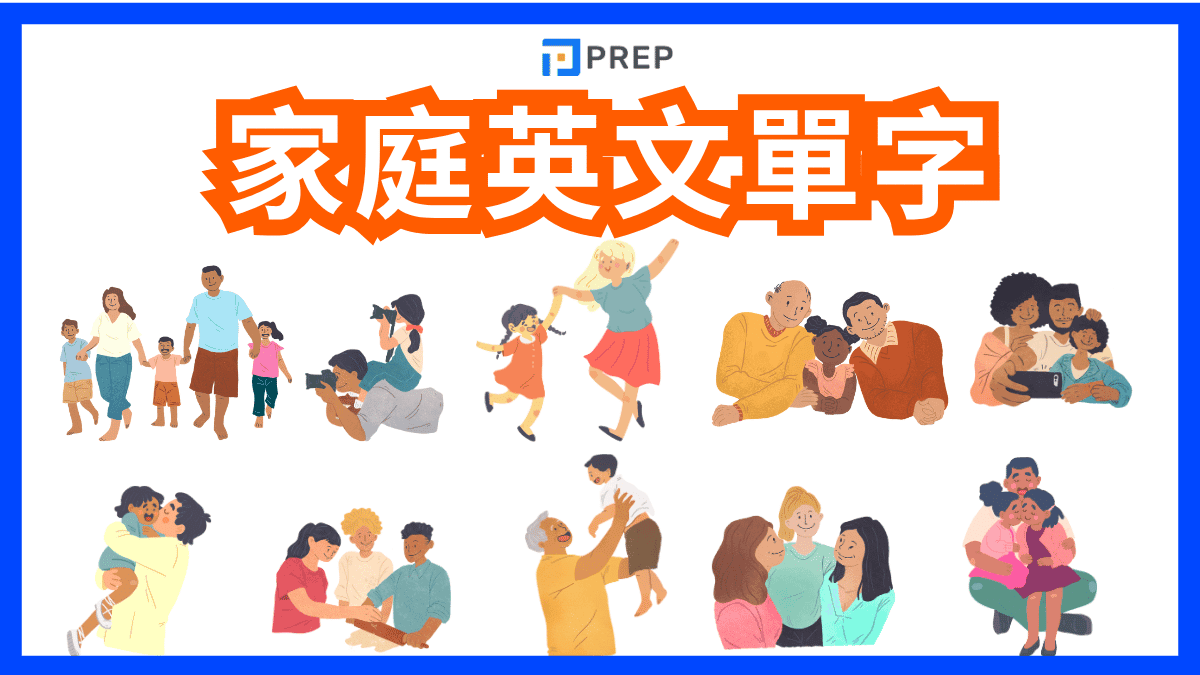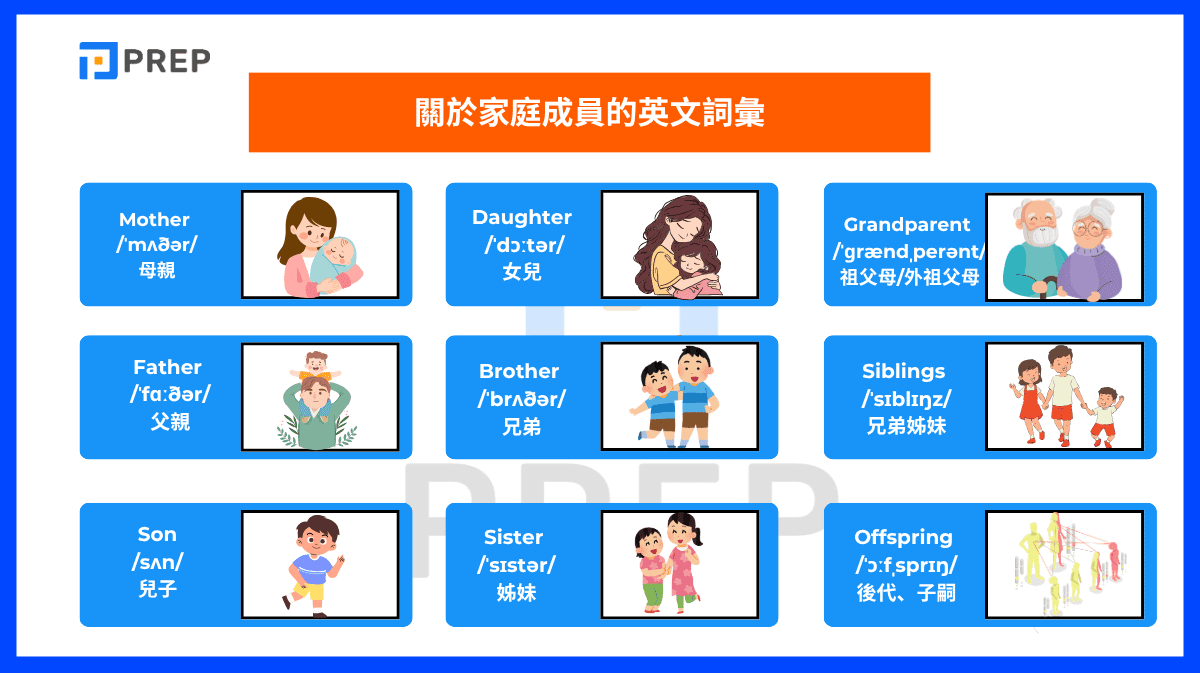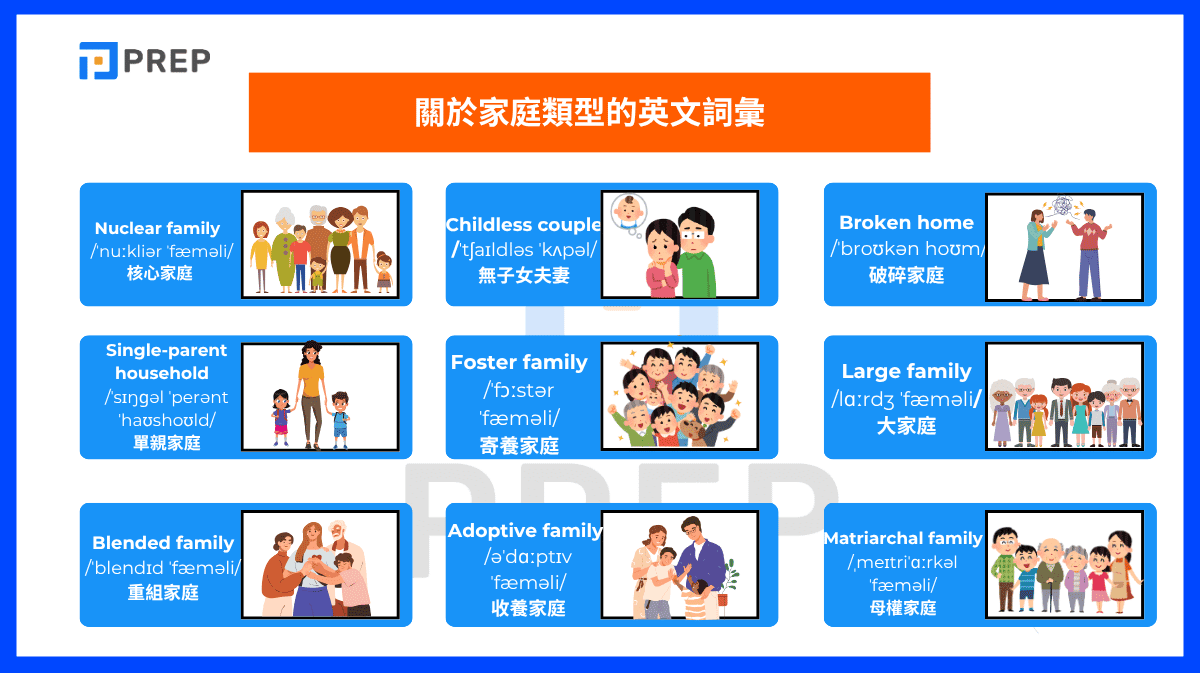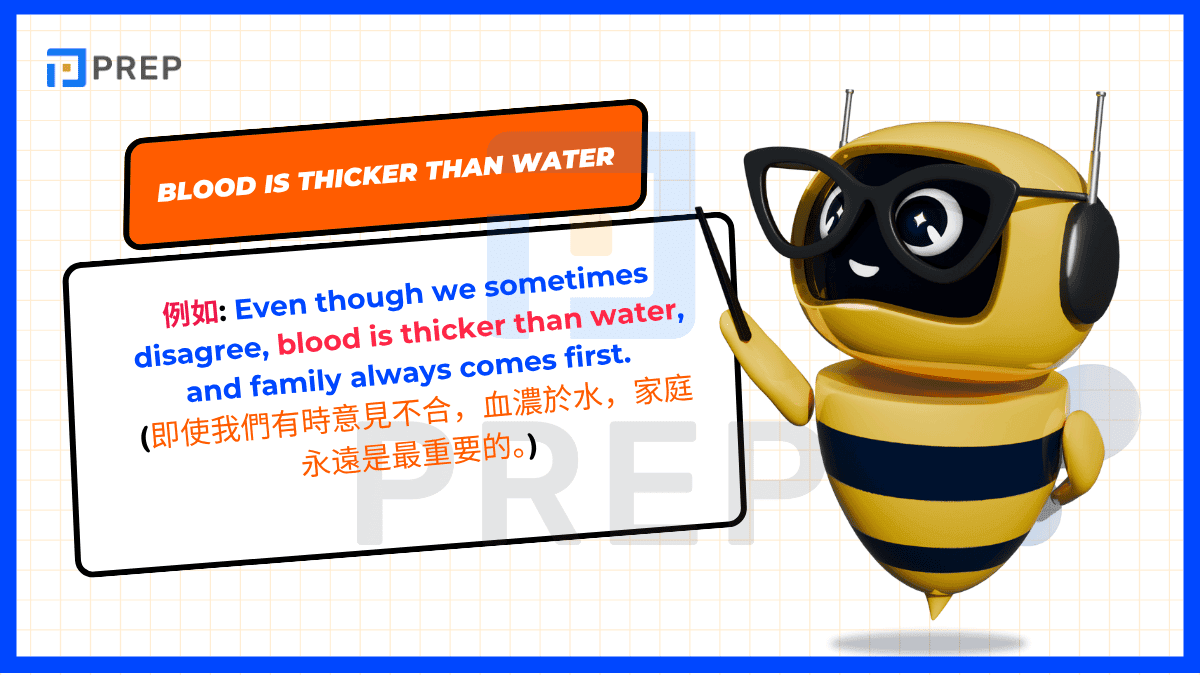您掌握了多少關於家庭的英文詞彙?立即「收下」最常用的50個詞彙
您是否曾在英語對話中想要介紹家人,卻發現自己只會說「father」、「mother」這些基礎詞彙?家庭英文詞彙的掌握程度直接影響您在雅思考試、職場溝通,以及日常英語交流中的表達深度。根據語言學習研究顯示,家庭主題是英語使用頻率最高的日常話題之一,但超過70%的英語學習者在此領域的詞彙量嚴重不足,僅停留在最基礎的10-15個單字。
現代家庭結構日趨複雜多元,從傳統核心家庭到重組家庭、單親家庭,每種型態都有其特定的英語表達方式。更重要的是,英語文化中的親屬稱謂系統與中文截然不同——英語將所有叔伯姑姨統稱為「uncle」和「aunt」,所有堂表兄弟姊妹都叫「cousin」,這種簡化卻精準的表達邏輯,正是許多學習者感到困惑的根源。
本文由PREP專業教研團隊精心整理,將為您揭示50個最實用的家庭英文詞彙,從基礎稱謂到進階關係描述,從正式用語到日常習語,幫助您建立完整的家庭主題英語表達體系。無論您正在準備雅思考試,還是希望提升英語溝通能力,這份詞彙寶典都將成為您語言學習路上的得力助手。

I. 英文家庭主題詞彙總結
家庭英文詞彙涵蓋範圍廣泛,從基礎的親屬稱謂到複雜的家庭結構描述,每個層面都可能成為考官評分的關鍵點。掌握這些詞彙不僅能提升您的語言準確性,更能展現您對當代社會議題的深度理解。
1. 關於家庭成員的英文詞彙
雅思口語和寫作中,準確使用家庭成員英文稱謂是展現語言能力的基礎。考官特別注重考生是否能區分正式和非正式用語,以及是否了解英語文化中的稱謂慣例。
|
家庭英文詞彙 |
中文翻譯 |
例句 |
|
Mother (n.) /ˈmʌðər/ |
母親 |
My mother works as a nurse in the local hospital. (我的母親在當地醫院擔任護士。) |
|
Father (n.) /ˈfɑːðər/ |
父親 |
My father has been teaching mathematics for over twenty years. (我的父親教數學超過二十年了。) |
|
Son (n.) /sʌn/ |
兒子 |
Their eldest son is currently studying abroad in Canada. (他們的長子目前在加拿大留學。) |
|
Daughter (n.) /ˈdɔːtər/ |
女兒 |
Their daughter just graduated from medical school. (他們的女兒剛從醫學院畢業。) |
|
Brother (n.) /ˈbrʌðər/ |
兄弟 |
My brother and I share many common interests. (我的兄弟和我有許多共同興趣。) |
|
Sister (n.) /ˈsɪstər/ |
姊妹 |
My sister is my closest confidant. (我的姊妹是我最親密的知己。) |
|
Husband (n.) /ˈhʌzbənd/ |
丈夫 |
Her husband supports her career ambitions completely. (她的丈夫完全支持她的職業理想。) |
|
Wife (n.) /waɪf/ |
妻子 |
His wife is a successful entrepreneur. (他的妻子是一位成功的企業家。) |
|
Grandparent (n.) /ˈɡrændˌperənt/ |
祖父母/外祖父母 |
My grandparents raised me with traditional values. (我的祖父母用傳統價值觀養育我。) |
|
Great-grandparent (n.) /ɡreɪt ˈɡrændˌperənt/ |
曾祖父母 |
I was fortunate to know my great-grandparents personally. (我很幸運能親自認識我的曾祖父母。) |
|
Grandchild (n.) /ˈɡrændˌtʃaɪld/ |
孫子/孫女 |
Their grandchildren visit every weekend. (他們的孫子女每個週末都會來拜訪。) |
|
Great-grandchild (n.) /ɡreɪt ˈɡrændˌtʃaɪld/ |
曾孫 |
She lived to see her great-grandchildren grow up. (她活著看到她的曾孫長大。) |
|
Aunt (n.) /ænt/ |
姑姑/阿姨 |
My aunt has always been like a second mother to me. (我的姑姑對我來說一直像第二個母親。) |
|
Uncle (n.) /ˈʌŋkəl/ |
叔叔/伯伯/舅舅 |
My uncle tells the best stories at family dinners. (我的叔叔在家庭聚餐時說最好聽的故事。) |
|
Cousin (n.) /ˈkʌzən/ |
表兄弟姊妹/堂兄弟姊妹 |
My cousins and I grew up together like siblings. (我的表兄弟姊妹和我一起長大,就像兄弟姊妹一樣。) |
|
Nephew (n.) /ˈnefju/ |
侄子/外甥 |
My nephew is extremely talented in music. (我的侄子在音樂方面非常有天賦。) |
|
Niece (n.) /niːs/ |
侄女/外甥女 |
My niece just won a scholarship to university. (我的侄女剛獲得大學獎學金。) |
|
Stepmother (n.) /ˈstepˌmʌðər/ |
繼母 |
My stepmother has been very kind and supportive. (我的繼母一直很善良且支持我。) |
|
Stepfather (n.) /ˈstepˌfɑːðər/ |
繼父 |
My stepfather married my mother when I was ten. (我的繼父在我十歲時與我母親結婚。) |
|
Stepbrother (n.) /ˈstepˌbrʌðər/ |
繼兄弟 |
My stepbrother and I get along very well. (我的繼兄弟和我相處得很好。) |
|
Stepsister (n.) /ˈstepˌsɪstər/ |
繼姊妹 |
My stepsister introduced me to her circle of friends. (我的繼姊妹把我介紹給她的朋友圈。) |
|
Half-brother (n.) /hæf ˈbrʌðər/ |
同父異母/同母異父兄弟 |
My half-brother lives with his mother most of the time. (我的同父異母兄弟大部分時間和他母親住在一起。) |
|
Half-sister (n.) /hæf ˈsɪstər/ |
同父異母/同母異父姊妹 |
Despite being half-sisters, we share a strong bond. (儘管是同父異母姊妹,我們有很強的情感聯繫。) |
|
Son-in-law (n.) /sʌn ɪn lɔː/ |
女婿 |
Their son-in-law is a respected doctor. (他們的女婿是一位受人尊敬的醫生。) |
|
Daughter-in-law (n.) /ˈdɔːtər ɪn lɔː/ |
媳婦 |
The daughter-in-law fits perfectly into our family. (這位媳婦完美地融入了我們的家庭。) |
|
Mother-in-law (n.) /ˈmʌðər ɪn lɔː/ |
岳母/婆婆 |
My mother-in-law gives excellent cooking advice. (我的岳母給予很好的烹飪建議。) |
|
Father-in-law (n.) /ˈfɑːðər ɪn lɔː/ |
岳父/公公 |
My father-in-law and I enjoy fishing together. (我的岳父和我喜歡一起釣魚。) |
|
Sister-in-law (n.) /ˈsɪstər ɪn lɔː/ |
嫂子/弟媳/姊夫的姊妹 |
My sister-in-law is also my best friend. (我的嫂子也是我最好的朋友。) |
|
Brother-in-law (n.) /ˈbrʌðər ɪn lɔː/ |
姊夫/妹夫/配偶的兄弟 |
My brother-in-law works in the same industry as I do. (我的姊夫和我在同一個行業工作。) |
|
Stepparent (n.) /ˈstepˌperənt/ |
繼父母 |
Having a stepparent can provide additional support. (有繼父母可以提供額外的支持。) |
|
Stepsibling (n.) /ˈstepˌsɪblɪŋ/ |
繼兄弟姊妹 |
My stepsiblings and I share holiday traditions. (我的繼兄弟姊妹和我分享節日傳統。) |
|
Adopted child (n.) /əˈdɑːptɪd tʃaɪld/ |
被收養的孩子 |
Their adopted child brings immense joy to the family. (他們的養子為家庭帶來巨大的快樂。) |
|
Adoptive parent (n.) /əˈdɑːptɪv ˈperənt/ |
養父母 |
Adoptive parents provide loving homes for children in need. (養父母為有需要的孩子提供充滿愛的家庭。) |
|
Foster parent (n.) /ˈfɔːstər ˈperənt/ |
寄養父母 |
Foster parents require special training and certification. (寄養父母需要特殊訓練和認證。) |
|
Foster child (n.) /ˈfɔːstər tʃaɪld/ |
寄養兒童 |
The foster child adapted well to the new environment. (寄養兒童很好地適應了新環境。) |
|
Immediate family (n.) /ɪˈmiːdiət ˈfæməli/ |
直系親屬 |
My immediate family consists of my parents, my younger sister, and myself. (我的直系親屬包括我的父母、妹妹和我自己。) |
|
Spouse (n.) /spaʊs/ |
配偶 |
Modern couples often discuss career priorities with their spouse before making major decisions. (現代夫妻在做重大決定前經常與配偶討論職業優先順序。) |
|
Siblings (n.) /ˈsɪblɪŋz/ |
兄弟姊妹 |
Research shows that children with siblings tend to develop better social skills. (研究顯示有兄弟姊妹的孩子往往發展出更好的社交技能。) |
|
Offspring (n.) /ˈɔːfˌsprɪŋ/ |
後代、子嗣 |
Parents invest considerable resources in their offspring's education. (父母在其後代的教育上投入相當多的資源。) |
|
Ancestor (n.) /ˈænsestər/ |
祖先 |
Many families maintain traditions passed down from their ancestors. (許多家庭維持著從祖先傳下來的傳統。) |
|
Descendant (n.) /dɪˈsendənt/ |
後裔 |
She is a direct descendant of a famous poet. (她是一位著名詩人的直系後裔。) |
|
Extended family (n.) /ɪkˈstendɪd ˈfæməli/ |
大家庭、擴展家庭 |
In many cultures, extended family members play crucial roles in child-rearing. (在許多文化中,大家庭成員在育兒方面扮演重要角色。) |
|
In-laws (n.) /ˈɪn lɔːz/ |
姻親 |
Building good relationships with in-laws can strengthen family bonds. (與姻親建立良好關係能加強家庭聯繫。) |
|
Breadwinner (n.) /ˈbredˌwɪnər/ |
養家糊口的人 |
In modern families, both parents often serve as breadwinners. (在現代家庭中,父母雙方通常都是養家糊口的人。) |
|
Caregiver (n.) /ˈkerˌɡɪvər/ |
照護者 |
Caregivers play essential roles in supporting elderly family members. (照護者在支持年長家庭成員方面扮演重要角色。) |
|
Guardian (n.) /ˈɡɑːrdiən/ |
監護人 |
The court appointed her aunt as the child's legal guardian. (法院指定她的阿姨為孩子的法定監護人。) |
|
Next of kin (n.) /nekst əv kɪn/ |
最近親屬 |
Please provide your next of kin for emergency contact purposes. (請提供您的最近親屬作為緊急聯絡人。) |
|
Heir (n.) /er/ |
繼承人 |
The eldest son is traditionally the heir to the family business. (長子傳統上是家族企業的繼承人。) |

2. 關於家庭類型的英文詞彙
現代社會中家庭結構日趨多元化,雅思考試經常涉及不同家庭型態的討論。這些家庭的英文詞彙能幫助您在寫作任務二中展現對社會議題的深刻理解。
|
家庭英文詞彙 |
中文翻譯 |
例句 |
|
Nuclear family (n.) /ˈnuːkliər ˈfæməli/ |
核心家庭 |
The traditional nuclear family model is evolving in response to changing social dynamics. (傳統的核心家庭模式正因應變化的社會動態而演進。) |
|
Single-parent household (n.) /ˈsɪŋɡəl ˈperənt ˈhaʊshoʊld/ |
單親家庭 |
Single-parent households face unique challenges in balancing work and childcare. (單親家庭在平衡工作和育兒方面面臨獨特挑戰。) |
|
Blended family (n.) /ˈblendɪd ˈfæməli/ |
重組家庭 |
Blended families require patience and understanding to create harmonious relationships. (重組家庭需要耐心和理解來創造和諧的關係。) |
|
Childless couple (n.) /ˈtʃaɪldləs ˈkʌpəl/ |
無子女夫妻 |
The number of childless couples is increasing in developed countries. (已開發國家中無子女夫妻的數量正在增加。) |
|
Multi-generational household (n.) /ˈmʌlti ˌdʒenəˈreɪʃənəl ˈhaʊshoʊld/ |
多代同堂家庭 |
Multi-generational households are common in many Asian cultures. (多代同堂家庭在許多亞洲文化中很常見。) |
|
Foster family (n.) /ˈfɔːstər ˈfæməli/ |
寄養家庭 |
Foster families provide temporary care for children in need. (寄養家庭為有需要的兒童提供臨時照護。) |
|
Adoptive family (n.) /əˈdɑːptɪv ˈfæməli/ |
收養家庭 |
Adoptive families go through extensive screening processes. (收養家庭需要經過廣泛的審查程序。) |
|
Broken home (n.) /ˈbroʊkən hoʊm/ |
破碎家庭 |
Children from broken homes may face emotional challenges. (來自破碎家庭的孩子可能面臨情感挑戰。) |
|
Single-child family (n.) /ˈsɪŋɡəl tʃaɪld ˈfæməli/ |
獨生子女家庭 |
Single-child families are increasingly common in urban areas. (獨生子女家庭在城市地區越來越常見。) |
|
Large family (n.) /lɑːrdʒ ˈfæməli/ |
大家庭 |
Managing a large family requires excellent organizational skills. (管理大家庭需要出色的組織能力。) |
|
Patriarchal family (n.) /ˌpeɪtriˈɑːrkəl ˈfæməli/ |
父權家庭 |
Traditional patriarchal families are led by the eldest male. (傳統的父權家庭由年長男性領導。) |
|
Matriarchal family (n.) /ˌmeɪtriˈɑːrkəl ˈfæməli/ |
母權家庭 |
Some cultures feature matriarchal families where women hold authority. (某些文化以母權家庭為特色,女性擁有權威。) |

3. 家庭關係的英文詞彙
描述家庭成員間的關係品質和互動模式是雅思口語Part 1和Part 3的常見考點。這些小家庭英文表達能幫助您更precisely描述家庭動態。
|
家庭英文詞彙 |
中文翻譯 |
例句 |
|
Close-knit (adj.) /kloʊs nɪt/ |
關係緊密的 |
We're a close-knit family who supports each other through thick and thin. (我們是一個關係緊密的家庭,彼此患難與共。) |
|
Estranged (adj.) /ɪˈstreɪndʒd/ |
疏遠的、關係惡化的 |
Unfortunately, he became estranged from his siblings after the inheritance dispute. (不幸的是,在遺產糾紛後,他與兄弟姊妹疏遠了。) |
|
Harmonious (adj.) /hɑːrˈmoʊniəs/ |
和諧的 |
They maintain a harmonious relationship despite their different personalities. (儘管性格不同,他們仍保持和諧的關係。) |
|
Dysfunctional (adj.) /dɪsˈfʌŋkʃənəl/ |
功能失調的 |
Children from dysfunctional families may require additional psychological support. (來自功能失調家庭的兒童可能需要額外的心理支持。) |
|
Protective (adj.) /prəˈtektɪv/ |
保護性的 |
Asian parents are often described as being protective of their children's future. (亞洲父母經常被描述為對子女的未來具有保護性。) |
|
Supportive (adj.) /səˈpɔːrtɪv/ |
支持的 |
Having supportive family members significantly impacts one's mental health. (擁有支持性的家庭成員對心理健康有重大影響。) |
|
Nurturing (adj.) /ˈnɜːrtʃərɪŋ/ |
養育的、關愛的 |
A nurturing environment helps children develop confidence. (養育性的環境幫助孩子培養自信心。) |
|
Authoritarian (adj.) /əˌθɔːrəˈteriən/ |
權威主義的 |
Authoritarian parents tend to have strict rules and high expectations. (權威主義的父母往往有嚴格的規則和高期望。) |
|
Permissive (adj.) /pərˈmɪsɪv/ |
寬容的、放任的 |
Permissive parenting styles allow children more freedom to make decisions. (寬容的教養方式讓孩子有更多自由做決定。) |
|
Overprotective (adj.) /ˌoʊvərprəˈtektɪv/ |
過度保護的 |
Overprotective parents may hinder their children's independence. (過度保護的父母可能阻礙孩子的獨立性。) |
|
Neglectful (adj.) /nɪˈɡlektfəl/ |
疏忽的 |
Neglectful parenting can lead to behavioral issues in children. (疏忽的教養可能導致孩子出現行為問題。) |
|
Traditional (adj.) /trəˈdɪʃənəl/ |
傳統的 |
Traditional families often emphasize respect for elders. (傳統的家庭通常強調尊敬長輩。) |
|
Progressive (adj.) /prəˈɡresɪv/ |
進步的 |
Progressive families embrace gender equality in household duties. (進步的家庭在家務分工上擁抱性別平等。) |
4. 家庭活動與人生階段的英文詞彙
家庭生活涵蓋了各種重要活動和人生階段,這些詞彙在雅思口語和寫作中都經常出現,特別是在描述個人經歷或社會現象時。
|
家庭英文詞彙 |
中文翻譯 |
例句 |
|
Upbringing (n.) /ˈʌpˌbrɪŋɪŋ/ |
教養、成長環境 |
My upbringing in a multicultural family shaped my worldview. (我在多元文化家庭的教養塑造了我的世界觀。) |
|
Child-rearing (n.) /tʃaɪld ˈrɪrɪŋ/ |
育兒 |
Modern child-rearing practices emphasize emotional intelligence. (現代育兒實踐強調情緒智能。) |
|
Family reunion (n.) /ˈfæməli riˈjuːnjən/ |
家庭聚會 |
Annual family reunions help maintain strong family bonds. (年度家庭聚會有助於維持牢固的家庭關係。) |
|
Heritage (n.) /ˈherɪtɪdʒ/ |
傳承、遺產 |
Preserving family heritage is important for future generations. (保存家庭傳承對後代很重要。) |
|
Legacy (n.) /ˈleɡəsi/ |
遺產、傳承 |
Long-term impact: "Parents hope to leave a positive legacy for their children." (父母希望為孩子留下正面的傳承。) |
|
Empty nest syndrome (n.) /ˈempti nest ˈsɪndroʊm/ |
空巢症候群 |
Many parents experience empty nest syndrome when children leave home. (許多父母在孩子離家時會經歷空巢症候群。) |
|
Coming of age (n.) /ˈkʌmɪŋ əv eɪdʒ/ |
成年、成人禮 |
Coming of age ceremonies mark the transition to adulthood. (成人禮標誌著向成年期的過渡。) |
|
Family outing (n.) /ˈfæməli ˈaʊtɪŋ/ |
家庭出遊 |
Regular family outings strengthen relationships and create memories. (定期家庭出遊加強關係並創造回憶。) |
II. 關於家庭的英語習語
雅思口語測驗中,適當使用慣用語和固定搭配能大幅提升您的語言自然度和流暢度分數。這些英文介紹家庭常用的習語不僅展現您的語言深度,更能讓考官印象深刻。掌握並自然地運用這些表達方式,是獲得高分的重要策略。
-
"Blood is thicker than water" 意思是血緣關係比其他關係更重要,常用於強調家庭loyalty的重要性。在雅思口語中,您可以說:Even though we sometimes disagree, blood is thicker than water, and family always comes first. (即使我們有時意見不合,血濃於水,家庭永遠是最重要的。)
-
"Runs in the family" 用來描述家族中共同的特質或才能的遺傳性。例如:Musical talent runs in our family – my grandmother, mother, and I all play piano professionally. (音樂天賦在我們家族中代代相傳——我祖母、母親和我都專業彈奏鋼琴。)
-
"Like father, like son" 表示父子相似的特質或行為模式。在描述家庭影響時可以使用:My father is an engineer, and I'm studying engineering too – like father, like son, I suppose. (我父親是工程師,而我現在也在學工程——我想所謂有其父必有其子吧。)
-
"The apple doesn't fall far from the tree" 與上述習語相似,強調子女與父母的相似性。例如: She has the same entrepreneurial spirit as her mother – the apple doesn't fall far from the tree. (她和媽媽一樣有創業精神——真是虎父無犬子)
-
"Family ties" 指的是家庭成員間的emotional bonds和責任關係。例如:Strong family ties contribute to better mental health outcomes in adolescents. (緊密的家庭聯繫有助於青少年更好的心理健康發展。)
-
"Black sheep of the family" 描述家庭中與眾不同或令人失望的成員。例如:Every family has its black sheep, but acceptance and understanding are crucial. (每個家庭都有自己的害群之馬,但接納與理解是至關重要的。)
-
"Flesh and blood" 強調血緣關係的親密性。例如:I can't turn my back on my brother – he's my own flesh and blood. (我無法對我弟弟置之不理——他可是我的至親骨肉。)
-
"Home is where the heart is" 表達家的emotional significance超越physical location。例如:Even though I've lived abroad for years, home is where the heart is – with my family. (即使我多年來都住在國外,心之所繫即為家——而我的家人就在那裡。)

III. 雅思口語第二部分:家庭主題範文
雅思口語第二部分的家庭主題是高頻考點,考生需要在2分鐘內流暢地描述一位家庭成員或家庭事件。以下範文展示了如何運用前面學到的詞彙和習語,創造連貫且吸引人的回答。
1. 題目
Describe a family member who has influenced you the most. You should say:
-
Who this person is
-
What your relationship with this person is
-
How this person has influenced you
-
And explain why this influence has been important to you
2. 範文
I'd like to talk about my grandmother, who has been the most influential person in my immediate family. She's my mother's mother, and at 78 years old, she remains the cornerstone of our close-knit family.
My relationship with her is exceptionally harmonious and deeply meaningful. Growing up in a nuclear family, I spent countless afternoons at her house after school, where she would help me with homework and share stories about our family history. She's always been incredibly supportive and protective, but never in an overwhelming way.
Her influence on me has been profound in several ways. First, she taught me the value of resilience and hard work. Having lived through difficult times when Taiwan was developing rapidly, she always emphasized that education and perseverance could overcome any obstacle. As she often says, "The apple doesn't fall far from the tree," and I've definitely inherited her determination.
Second, she instilled in me a deep appreciation for family values. Our grandmother constantly reminds us that "blood is thicker than water," and family should always come first. Thanks to her influence, our extended family maintains strong family ties despite living in different cities.
Most importantly, she taught me about unconditional love and acceptance. Even when I made mistakes or disappointed the family, she remained supportive and understanding. She has this remarkable ability to see the best in people, which has shaped how I approach relationships in my own life.
This influence has been crucial because it provided me with a strong moral foundation and emotional stability. In today's fast-paced world, having someone who represents consistency and wisdom is invaluable. Her teachings about family loyalty and personal integrity guide my decisions even now that I'm an adult.
Moreover, watching how she maintained a harmonious multi-generational household taught me important skills about patience, compromise, and communication. These lessons have proven essential in my personal relationships and professional collaborations.
In conclusion, my grandmother's influence extends far beyond typical grandparent roles. She's been a mentor, friend, and moral compass, showing me that true strength comes from love, family connection, and never giving up on the people you care about.
IV. 結論
掌握家庭英文不僅是雅思考試成功的關鍵,更是有效跨文化溝通的基礎。透過系統性的詞彙學習、慣用語運用和文化理解,您已經建立了全面的家庭主題表達能力。
在雅思備考過程中,請記住這些詞彙和表達方式需要在真實語境中練習才能真正內化。無論是在口語測試的即興回答中,還是在寫作任務的結構化論證中,自信且準確地使用家人英文表達將大幅提升您的整體表現。
這份指南提供的資源 - 從基礎家庭成員詞彙到複雜關係動態,從傳統慣用語到現代家庭結構 - 將在雅思考試中為您提供良好服務,更在未來的學術和專業發展中發揮作用。請持續在真實對話和寫作練習中運用這些表達方式,讓它們成為您英語溝通能力的自然組成部分。
最重要的是,請記住語言學習是持續的過程。隨著您的經驗擴展和文化理解加深,您對家庭相關話題的表達將變得更加細膩和精深。這份基礎將支持您在達成雅思目標分數的同時,培養真正的英語溝通能力。
PREP 結合 AI 的智慧學習與考試平台,讓您能在家自主線上學習,高效準備 IELTS、TOEIC與英語溝通課程。Teacher Bee AI 將提供一對一支援,協助您迅速提升技能。
如需了解更多課程詳情,請點擊此處立即諮詢!現在就下載 PREP App,在家體驗高品質的線上英語學習之旅。

你好!我叫黃秋賢。現在在網站 prepedu.com 的部落格擔任產品內容經理。
我有超過5年的英語、韓語等外語自學經驗,並準備過 IELTS、TOEIC、TOPIK 等考試,累積了豐富的實戰知識,也曾協助數千位在語言學習上遇到困難的人。希望以上的分享能幫助大家在家中更有效率地自學!
評論











